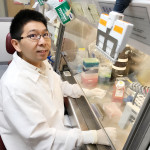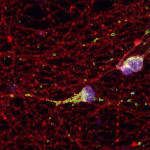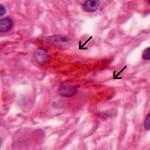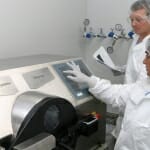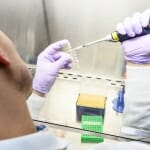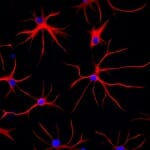Tag Waisman Center
UW–Madison researchers first to 3D-print functional human brain tissue
It’s an achievement with important implications for scientists studying the brain and working on treatments for a broad range of neurological and neurodevelopmental disorders, such as Alzheimer’s and Parkinson’s disease.
Video games teach balance, reduce symptoms in autistic adolescents
Waisman Center researchers hope to identify outcomes of balance training that will be meaningful to autistic adolescents and contribute to their quality of life.
Stem cell project to create new model to study brain development and Down syndrome
The research is funded through an $11 million Transformative Research grant from the National Institutes of Health, which supports exceptionally innovative or unconventional research projects with the potential to advance their field.
Guggenheim Fellowship awarded to UW–Madison psychology professor
Seth Pollak’s research focuses on the influences of environmental risk factors on children’s brain and behavioral development, with particular focus on emotions and learning.
Artificial intelligence can accelerate clinical diagnosis of fragile X syndrome
Researchers from the Waisman Center found that people with fragile X are more likely to also have a variety of circulatory, digestive, metabolic, respiratory, and genital and urinary disorders.
Dolan led Waisman Center in two decades of growth
Dolan was instrumental in expansion of the center to include laboratories dedicated to stem cell and gene therapy research, a biomanufacturing facility, a brain imaging center, and new space for the Waisman Early Childhood Program.
Holocaust survivor, geneticist, patient advocate remembered for inspiring others
Renata Laxova focused on intellectual and developmental disabilities, prenatal diagnosis of birth defects, cancer genetics, and — above all — the relationships between medical professionals and patients.
Waisman Biomanufacturing partners with Heat Biologics to manufacture COVID-19 vaccine
The vaccine will target those most vulnerable to COVID-19 — namely, the elderly and those with health conditions that weaken their immune system. Phase 1 trials could begin in early 2021 and UW–Madison may be a trial site.
Low genetic risk for ADHD may protect against negative life experiences
Adults with lower genetic risk for ADHD also reported, on average, higher IQs and educational attainments, shorter or no criminal records, lower body mass index (BMI), and lower rates of depression than adults with middle-to-high genetic risk for ADHD.
Electronic records pin broad set of health risks on genetic premutation
UW–Madison's Marsha Mailick led researchers from the Waisman Center and Marshfield Clinic in a study that employed machine learning to mine decades of electronic health records of nearly 20,000 individuals.
Waisman’s stem cell research into Down syndrome gives family hope
It’s not a cure for Down syndrome that Dave Witte and Cristina Delgadillo want for their 5-year-old daughter. But they would be happy if stem cell research at the Waisman Center reduces the complications faced by Olivia, who has had two heart surgeries and a stroke.
Scientists discover cause of aging-related disease in mice, then reverse its symptoms
UW–Madison researchers have shown that mice making too much of a human protein called AT-1 show signs of early aging and premature death, which are also symptoms of the human disorder progeria.

